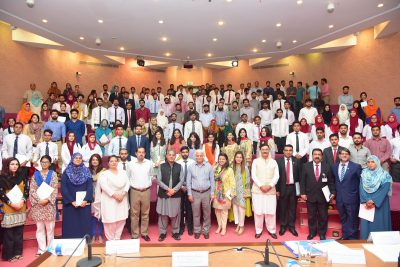On the eve of International Youth Day-2017, a parliamentary dialogue on “Youth Building peace” was held at Pakistan Institute for Parliamentary Services in collaboration with the Young Parliamentarians Forum of the National Parliament on August 08, 2017.
The event commenced with recitation of verses from the Holy Quran followed by National Anthem of Pakistan. The dialogue included three plenaries and two breakout sessions. Panelists included Senator Farhatullah Babar; Ms. Shaza Fatima Khwaja, MNA; Mr. Malik Muhammad Uzair Khan, MNA; Senator Mr. Osman Saifullah Khan; Mr Shehryar Khan Afridi, MNA; Senator Ayesha Raza Farooq; Mr. Ihsan Ghani, National Coordinator, National Counter Terrorism Authority, Mr. Zafarullah Khan, Executive Director, PIPS and Mr. Muhammad Rashid Mafzool Zaka, Director Research and IT, PIPS.
The event was attended by around 150 participants including Members of the Parliament, academia, and diplomatic community along with a large gathering of students from 25 universities and colleges from all over Pakistan.
The key recommendations of the Youth for Peace Seminar was finalized, read and approved in the concluding session with Ms Shaza Fatimah Khawaja, MNA, General Secretary YPF in the chair:
Peace through inclusive development:
- It is important to include people at every level, every tier of the society to ensure sustainable peace and development. We have to keep Pakistan’s recent youth bulge in mind and that the median age in Pakistan is 22 years. Leadership opportunities may be created in every field for the young generation including encouragement for entry into politics. From grass root level to national level politics, we need younger people to lead the young nation.
- We should strive to remove inequality at various levels of the society, whether it is in income, resources or opportunities. We require equitable division of resources and affirmative action in those areas from where investments are generated. Investments need to be revolved in the marginalized areas and provinces in such a way that they are equally distributed in all the areas. Investment should be increased in underprivileged areas to increase the financial activity.
- Either at domestic, social or institutional level, a non-conformist approach to education should be taken so that an inquisitive generation is developed who is not shy of asking questions. If we want inclusive and sustainable development, and if we want long lasting peace in Pakistan, we need young people to come out and ask questions, to challenge more concepts and to be heard.
- Young people need to be provided with platforms where they can express and share and a level playing field where they can take any actions necessary for development. With the help of active citizenship, Pakistan can be benefitted in two ways. Firstly, all frustration among young people can be dissolved through providing them the confidence and a platform to implement their ideas which will prove to be an avenue for them to vent out their frustration in a peaceful and respectful manner. Secondly, the citizens will be complimenting the efforts of the State, the Government. Both will be able to support each other for the welfare of Pakistan.
Interfaith Harmony in Promoting Peace and Tolerance through Culture
- Education from schools to universities are based on three principles: seeking Knowledge as top priority, freely accepting each other and contributing for mutual good of fellow citizens and society at large.
- Sufi and folk tradition and popular culture including music and cinema are Society’s indigenous sources, which need to be perpetually utilized to promote messages of interfaith harmony.
- Education and Training of teachers and reform in curriculum to transform the class environment more creative-oriented is essentially recommended to education departments of all federating units and CAD as well as the standing committees on education in National Parliament and provincial assemblies.
- Education standards and opportunities in rural and urban areas should be the same.
- Humans and Humanity should be focused in our national discourse so as to perpetually evolve a culture of tolerance where we agree to disagree with each other, respect each other’s point of views and learn to feel the joy of the unity in diversity.
- Greater political will by all parliamentary parties is required to review existing legislations and ensure better implementation viz a viz media regulations and blasphemy laws.
- Strengthening of parliamentary tradition, constitutionalism and dialogues across institutions, stakeholders and civil society at large is imperative to promote peace, harmony as well as respect and affirmative action to have assured emancipation of all including non-Muslims and minorities in every facet of the society.
